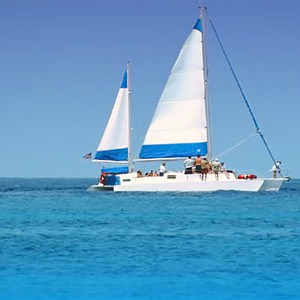Please Register / Login to take part in discussions about the Virgin Islands.
My husband and I are visiting St. Thomas in June for the first time, just wondering if we might have the opportunity to interact with wild dolphins. Thanks!
Interact? - unlikely -- see them if you are out boating? - possible but not common and stopping the boat to swim with them has happened but rarely - See them from the beach - occasionally - last year a mother and calf played in Magens Bay for a few days.
exit zero wrote:
Interact? - unlikely -- see them if you are out boating? - possible but not common and stopping the boat to swim with them has happened but rarely - See them from the beach - occasionally - last year a mother and calf played in Magens Bay for a few days.
I agree with ez. but we captured the moment between St John and Jost Van Dyke about 2 years ago..
http://www.youtube.com/watch?v=3DRLhSkI69c&feature=channel_page
AWESOME!!! I was fortunate enough to have this experience in Hawaii. Those lucky folks you had on board....
Thanks for sharing! I loved it!
Deb
They often swim along with the boats sailing out to Buck Island on STX. But I've never heard of an in-the-water encounter.
Last summer we were boating with friends. While we were anchored and swimming around we had a visitor that stayed in the immediate area for about 45 minutes.
[video] http://www.youtube.com/watch?v=EvMIsEqph_E [/video]
Our visitor stuck around as long as we didn't go near him (her). It was a great experience.
Another video of the same encounter.
[video] http://www.youtube.com/watch?v=MQzBqHS3UQY [/video]
Wow! What a wonderful, unique experience. Thanks for capturing it and sharing.
I had a similar experience several years ago when participating in a fishing tournament and, off the West End of St Thomas, we suddenly encountered a dolphin group who seemed to take so much enjoyment in playing around the boat and regaling us with their antics. They followed us for a magical half hour.
Swimming with them wasn't an option as the waters out there on the West end of STT are turbulent at best. Nonetheless it was an incredible experience and as much as I know that some people want to "swim with dolphins" at theme parks and elsewhere, I have a problem with that whole concept. Enough said!
I agree with you regarding the whole "swim with the dolphins" thing at parks etc. We were lucky enough to run into this dolphin that wanted to "swim with the humans" that very fine summer day.
FEEDING AND SWIMMING WITH DOLPHINS IS ILLEGAL AND HARMFUL, FEDERAL AGENCY WARNS
Florida boaters who encourage the impressive antics of wild dolphins by feeding or swimming with the animals harm the dolphins and themselves -- and may be fined for breaking the law, the National Oceanic and Atmospheric Administration announced today.
According to reports received by NOAA's National Marine Fisheries Service, recreational boaters and swimmers have been injured when illegally feeding or swimming with wild dolphins off Florida. People have been sent to the hospital for stitches or medical attention due to severe bites and body strikes during interactions.
"Dolphins have a reputation for being friendly to humans, but the fact remains they are powerful, wild animals that can be very aggressive," said Nancy Foster, deputy director of NOAA's National Marine Fisheries Service. "Feeding and swimming with dolphins may appear to be fun for humans, but can be very harmful to both the dolphins and the people."
Although commercial dolphin-feeding cruises were effectively stopped in October 1993 following a federal court ruling, NMFS officials are concerned about recreational boaters and others who continue to feed and swim with dolphins. NMFS officials are particularly concerned about a recent increase in feeding activities in Ft. Walton Beach, Denton, Panama City, Sarasota and Key West. The fisheries service and local authorities have stepped up enforcement in those areas and will soon post federal "no-feeding" signs and issue fines to people caught feeding or swimming with the animals.
Foster said that feeding these marine mammals can make them less able -- or willing -- to search for food on their own. In addition, she said, food, if it's non-natural or contaminated, can pose a serious health risk and even death to the dolphins.
NMFS officials have reports of people seen feeding dolphins beer, hot dogs and candy bars -- items Foster called "totally inappropriate and harmful."
Even more threatening, said Foster, is the danger that feeding or swimming with the dolphins will cause them to become habituated to humans and make them lose their natural wariness as wild animals.
"Dolphins that become desensitized toward humans are highly at risk of getting entangled in commercial fishing nets, hit by boat propellers, exposed to polluted water, or being intentionally harassed by people," Foster said.
Recently, a dolphin that may have been begging for food from humans jumped into a boat and was killed by the impact. Feeding wild dolphins has become an increasing and on-going problem since the late 1980's in many southeast coastal areas, including Florida, Texas and the Carolinas.
Dolphins fed by people are also in danger of being perceived as "nuisance" animals. Increasingly, recreational and commercial fishermen in Florida have complained that dolphins have learned to take fish off their lines. The fishermen are unable to catch the fish they want and the dolphins run the risk of ingesting baited hooks. Dolphins that have stranded dead have been found with hooks and fishing line in their stomachs.
Scientists and conservationists are concerned that in the future, there will be public outcry to remove -- or even kill -- dolphins considered to be a nuisance. In the 1970's there was a similar problem in Yellowstone National Park with the public feeding wild bears.
A report by the Australian government and American scientists was published in 1994 on the famous Monkey Mia resort in Western Australia where the public is legally allowed to give handouts to certain dolphins. Researchers found the offspring of dolphins that take handouts are less likely to survive than the offspring of dolphins that do not interact with people. These studies show that more than 70 percent of the infant dolphins born to mothers that take fish from people have died.
NMFS law enforcement officers have been working with the Florida Marine Patrol and the U.S. Coast Guard to educate recreational boaters and others who may be unaware of the fact that feeding and swimming-with wild dolphins is both harmful and illegal.
"Most people know that feeding or swimming with wild dolphins is illegal but they don't seem to understand or want to believe that it's harmful to the animals and can also be harmful to humans. People need to respect these animals and let them be wild," said Special Agent Bob Spraitz of the NMFS Enforcement office in St. Petersburg, Fla. "We have numerous reports on file of dolphins acting aggressively towards people."
In December 1994, a dolphin off the coast of Brazil seriously injured a man who witnesses say was harassing the dolphin. The man subsequently died from those injuries.
On Oct. 29, 1993, NOAA won a court case that reinstated a federal regulation prohibiting dolphin-feeding activities in U.S. waters. Violation of this regulation carries stiff civil and criminal penalties with fines ranging between $10,000-$20,000. In 1994, NMFS submitted to Congress a comprehensive report documenting the history and problems of feeding wild dolphins.
Dolphins and other marine mammals such as whales, seals and sea lions have been protected since 1972 by the Marine Mammal Protection Act. Feeding and swimming with any wild marine mammal is considered to be a "take" and "harassment" under the MMPA and is prohibited by law.
Awesome video's! Thanks for sharing! The next time I get the chance, you bet I will be IN the water with them! (tu)



